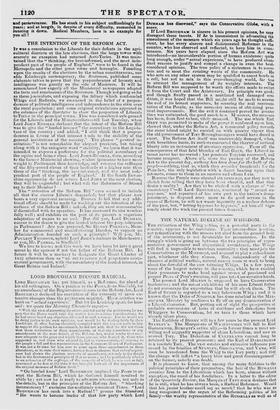THE INTENTION OF THE REFORM ACT.
IT was a consolation to the Liberals for their defeats in the agri- cultural districts at the late elections, that the large towns with scarcely an exception had returned Anti-Tories. It was main- tained that the '• thinking, the best-informed, and the most inde- pendent part of the people of England," were to be found in the Metropolis and the other great cities and boroughs. Founding upon the results of the elections by the urban constituencies, our able Edinburgh contemporary, the Scotsman, published some elaborate tables to prove that the preponderance of honesty and intelligence was greatly on the side of Ministers. It will be remembered how eagerly all the Ministerial newspapers adopted the facts and conclusions of the Scotsman. Though not going so far as these journalists, and exposing the fallacy which confounded Whigs and Radicals, we concurred in the belief of a prepon- derance of political intelligence and independence in the civic over the rural population; and some original calculations appeared in the columns of the Spectator to show the proportion of Liberals to Tories in the principal towns. This was considered safe ground fur the Liberals and the Ministerialists—till last Tuesday, when Lord JOHN RUSSELL declared that the intent of the Reform Bill was to give the " landed interest" the ascendancy in the Legisla- ture of the country ; and added, " I still think that a prepon- derance in favour of that interest t,,,nds to the stability of the general institutions of the country." The phrase " general in- stitutions" is not remarkable for elegant precision, but taking along with it the eulogistic word " stability," we learn that it was intended to express a preference fer the political ascendancy of the squire and farmer class. Lord JOHN RUSSELL, then, according to the former Ministetial showing, wishes ignorance to have more weight in Parliament than knowledge, and esteems the suffrages of the fifty-pound slaves of their landlords at a higher rate than those of the " thinking, the best informed, and the most inde- pendent part of the people of England." If the South Devon- shire squirearchy do not return Lord JOHN at the next election, they will be ungrateful ; but what will the Reformers of Stroud say to their Member ? The " intention of the Reform Bill" once seemed to include all that the sincere Liberals demanded; but that phrase now bears a very equivocal meaning. heaven forbid that any addi- tional efforts should be made for working out the intention of the authors of the Reform Bill : indeed, they are most unreasonable if dissatisfied with its operation. It has answered its aim wonder- fully well ; and exhibits on the part of its parents a sagacious adaptation of means to an end. But did you, Lord DURHAM, concur in the desire to give the lauded interest the preponderance in Parliament? Are you prepared, Sir HENRY PARNELL, Mem- ber for commercial and manufacturing Dundee, to support an Administration founded on such a principle ? Will you, Mr. Po CLETT TuostsoN, uphold Lord JOHN'S doctrine in Manchester; Or you, Mr. PARKER, We live to learn; and this week we have been let into a great secret by the sponsor if not the father of the Reform Bill. In future it will be a mockery to designate the Great Charter of 1832 otherwise than as "an act t3 secure and perpetuate aristo- cratical government, with the ascendancy of the lauded interest, in Great Britain and Ireland:*


























 Previous page
Previous page